Iranians Condemn Navalny’s Death, As State Media Treads Carefully

Iranian opposition activists have unequivocally condemned the sudden suspicious death of Alexei Navalny, an outspoken critic of Russian President Vladimir Putin.

Iranian opposition activists have unequivocally condemned the sudden suspicious death of Alexei Navalny, an outspoken critic of Russian President Vladimir Putin.
The Iranian regime is a close ally of Vladimir Putin, while opposition activists see the relationship as an unholy alliance between two brutal dictatorships.
Citing figures provided by World Liberty Congress as to the existence of over one million political prisoners around the world, prominent Iranian dissident Masih Alinejad criticized the inaction of democratic countries.
“Navalny's murder is a chilling reminder of how authoritarian regimes can kill innocent political prisoners while democratic countries are busy with empty condemnations,” she wrote on X, adding that “Putin, Khamenei and other dictators are not only killing dissidents within their countries but they are working together.”
“The alliance of dictators is the real threat facing global security. The problem is clear: when it comes to taking action, dictators are more united and determined than democratic countries,” she further remarked.
Hamed Esmaeilion, another opposition figure, hailed Navalny as a hero and stated that biological terror, exile and prison all failed to silence his voice in the struggle for freedom.
He will be remembered for his greatness and courage contrary to such criminal dictators as Vladimir Putin, Ali Khamenei and Bashar al-Assad who belong to the abyss of history, Esmaeilion pointed out.
Mehrangiz Kar, lawyer and human rights activist, referred to the incident as a murder and said, “Putin, Khamenei’s mentor, killed Navalny, this great man.”
Actress and political activist Nazanin Boniadi urged democracies to take action against the killings of political prisoners by dictators.
“If democracies don’t stand united, autocracies will continue to murder their critics with impunity. Every freedom loving human should turn their outrage into action,” she wrote on X. Many ordinary Iranians also expressed their outrage on social media, likening the Iranian regime to Putin's dictatorial system.
However, the media close to the Iranian regime and the IRGC have been largely silent on Navalny's death. Fars news agency, affiliated with the IRGC, chose not to cover his death at all.
IRNA, the Iranian state news agency, dedicated its coverage of the incident only to the official stance of Russia, reactions of the international community and reports of arrests made during the vigils held in Russia to commemorate the leader of the opposition.
The same kind of coverage can be traced in Mehr news agency, close to Iran’s hardliners, which only reported Navalny’s death, international condemnations and Russia’s responses. Reflecting the remarks of Russian ambassador to Washington Anatoly Antonov, Mehr entitled one of its reports on the incident as “the US’ attempt to interfere with Russia’s internal affairs following Navalny’s death.”
IRGC-affiliated Tasnim news agency also employed the same reporting but not commenting strategy. In a short 7-paragraph report titled “Putin’s pro-West opponent dies: Who was Alexei Navalny?” Tasnim simply wrote about his trials and sentences.
The relatively more independent media in Iran, nonetheless, used a more analytical and investigative approach to Navalny’s demise.
Khabaronline traditional-conservative website mentioned the remarks of Ahmad Zeidabadi, a commentator in Tehran.
“Accepting that Navalny died of natural causes in a Russian prison is like accepting that Putin has fulfilled his repeated promises not to attack Ukraine,” Zeidabadi said, further adding that “the world is becoming a more cruel place day by day and Putin and Putinism play a significant role in this process.”
“It is as if the continuous rise and fall of autocratic leaders and regimes in Russia is the destiny of this great and genius-breeding country. May God save it,” he went on to say.
Reformist daily Shargh published an article entitled “Navalny and the Russian syndrome.” Referring to the fates of the prominent Putin critics such as Alexander Litvinenko, Yevgeny Prigozhin, Sergei Skripal, Alexander Perepilichny and Vladimir Kara-Murza, Shargh ironically attributed the incidents to “a Russia syndrome which affects Putin’s opponents.”